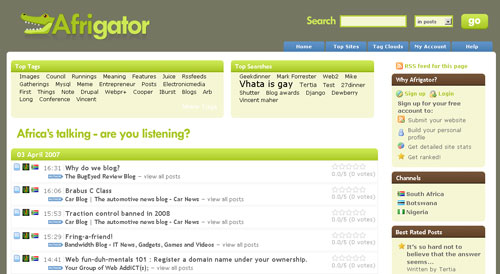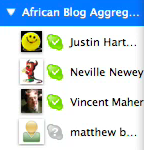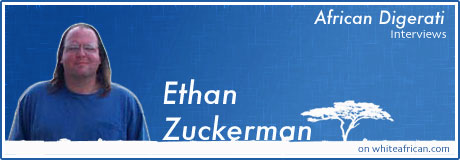 Afrigator launched today, an excellent new website dedicated to aggregating blog posts from Africa. It joins the ranks of 1-year old Muti, 1-month old Amatomu, and 1-week old Mashada.
Afrigator launched today, an excellent new website dedicated to aggregating blog posts from Africa. It joins the ranks of 1-year old Muti, 1-month old Amatomu, and 1-week old Mashada.
Afrigator (clever word play on aggregator) is the product of two stars from the South African blogosphere and tech community, Mike Stopforth and Justin Hartman. I was fortunate enough to have spoken with them about their upcoming launch last week, but didn’t realize just how soon it was coming! So, first of all congrats on the super-fast launch. Another shout-out goes to Mark Forrester on the design, it looks brilliant.
How is it Different?
The first question everyone has to ask is what they are doing differently in order to get market share. Arguably, Muti has the most pan-African attention at this point and Amatomu has the most South African attention.
The first answer is “Channels“. This is the big thing that has been missing and needed to be addressed. Muti has struggled to be more than just a South African aggregator because that’s the part of Africa that has claimed it (plus the domain URL). Amatomu is great for South Africans, but doesn’t tend to reach the greater part of Africa. Amotomu is very new however, and their .com domain name means they might have bigger plans than just South Africa (Vincent?).
Every blogger chooses a country when they sign up. That country then becomes a new channel on Afrigator (brilliantly mechanism. However, they’re missing a big section of the African blogosphere – there needs to be a channel for African diaspora in the US, Europe, Asia, etc…). Readers can then sort the normal Afrigator results by the country they care about hearing from.
Second, the ability to give a 5-point rating to posts. This works much like Muti in that the best content rises to the top. I wonder if they have built into their system an algorithm that tracks the overall quality of specific bloggers? That might be too controversial though.
Final Thoughts
Overall, I’m extremely impressed with Afrigator. They’ve started a great thing here, and I can only see them doing better as time passes.
One thing that I don’t like about what both Amatomu and Afrigator are doing though is that you have to embed their code within your own website. I realize that the data mining from that is a HUGE opportunity for them, but personally I don’t like it. I’d like to see them do measurement on a more non-intrusive basis.

 This week I’m in San Francisco at the Web 2.0 Summit. I just found out that Colin Daniels (Youngblood) of the Sunday Times is here as well. It makes me wonder how many other Africans are at it?
This week I’m in San Francisco at the Web 2.0 Summit. I just found out that Colin Daniels (Youngblood) of the Sunday Times is here as well. It makes me wonder how many other Africans are at it?
 The internet has a way of democratizing information and connectivity. This is the case with a new site, called
The internet has a way of democratizing information and connectivity. This is the case with a new site, called 

 Justin Hartman (
Justin Hartman (



